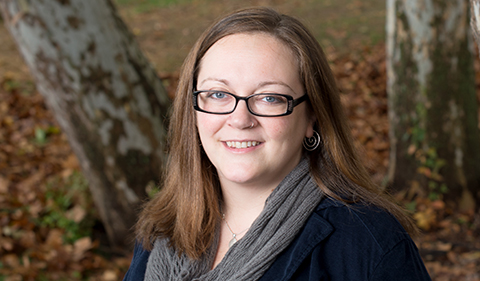
Dr. Kelly Faust
Dr. Kelly Faust, Assistant Professor of Sociology at Ohio University, traveled to Indianapolis in March to the North Central Sociological Association annual meeting. She presents two papers, “State Crime SVU: Analysis of Untested Sexual Assault Kits” and “Using Podcasts in the Classroom: Comparing Strategies and Topics.”
For “Using Podcasts in the Classroom: Comparing Strategies and Topics,” Faust talks about the use of American Public Media’s In the Dark podcast on the abduction of Jacob Wetterling in 1989, and the recent confession in the case, in her criminology course. The podcast was helpful in teaching about a number of concepts including crime myths, fear of crime, public opinion, measurement of crime (UCR, NIBRS, and NCVS), clearance rates and other crime data, plea bargains, sex offender registration laws, and policy creation in general and increased student engagement.
Abstract for “State Crime SVU: Analysis of Untested Sexual Assault Kits:” The ability to forensically test DNA revolutionized the criminal legal system and criminal investigations. In no time at all requests for testing outpaced the human and laboratory resources available. Labs across the country reported increasing backlogs; cases that remain untested for more than 30 days after being submitted. From 2004-09 the NIJ provided $330 million in direct grants to laboratories for improvements in equipment and staff. Despite this, the demand for DNA testing grew even faster and the backlog increased from 23,030 to 111,647. With these numbers steadily increasing, it may seem as though we are looking at the problem with DNA testing in its entirety. In fact, recent media reports have documented the existence of hundreds of thousands of unsubmitted Sexual Assault Kits (SAKs) across the country. Over 10,000 untested SAKs were found in a police storage warehouse in Detroit; 13,000 in Ohio; 5,000 in Indiana, and 9,000 in Tennessee just to name a few. Each of these SAKs is a victim who has had the opportunity for justice limited by a law enforcement official. One must ask how this came to be the reality for so many victims. This paper investigates these unsubmitted SAKs as a state crime by examining the decisions made by law enforcement officers and others, as well as organizational behaviors, and social environmental factors.
The theme of this year’s annual meeting is Peace in a Time of Polarization. Polarization means more than politicians behaving badly or strong disagreement. Instead David Lankenhorn, of the Institute for American Values, defines polarization as “with an intense commitment to a candidate, culture or ideology” that divides people into rival groups. A 2014 Pew Report found that Americans are experiencing more “affective polarization” – emotionally, charged negative feelings about those in the other political camp. These polarizing negative feelings have become so intense that they are changing were people choose to live and with whom they choose to be in relations. And polarization thwarts empathy. Sociology and sociologists are uniquely qualified to look at both the impact of polarization and peace. During this year’s annual meeting, researchers continue to explore the sociological connections between these ideas.
The North Central Sociological Association is a regional sociology association including: Eastern Illinois, Indiana, Michigan, Ohio, Kentucky, Western Pennsylvania, West Virginia and Ontario, Canada. The objectives of the NCSA are to further the development of sociology as a scientific and scholarly discipline through stimulation and promotion of (1) scientific research in its defined subject matter area; (2) the widest possible and feasible utilization of the knowledge and skills of sociologists and the findings of scientific sociological research by public and private agencies in all relevant social policy issues; (3) effective teaching of the subject matter at all levels of educational endeavor; and (4) interchange and cooperative relations among persons and organizations engaged in the scientific study of society; any and all such other acts as may be deemed conductive to these ends.


















Comments